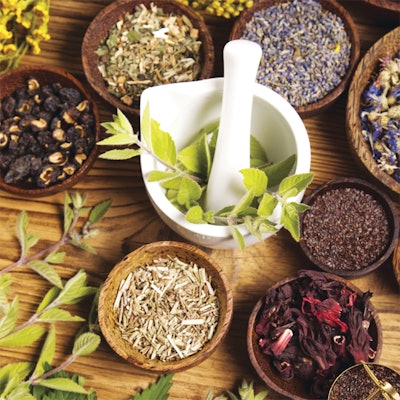 [Image: Getty Images]
[Image: Getty Images]Pimples, blemishes, whiteheads, blackheads, cysts or pustules—whatever the form, acne is just not pretty. This unpleasant, often uncomfortable condition occurs when pores become blocked by oils, dirt and dead skin cells. Bacteria overbreeds, and irritation and inflammation ensue. Although acne can affect the chest, back and other parts of the body, it’s most often found on the face. In such a visible place, it can lead clients to feel self-conscious, and even seriously affect their selfesteem and inner confidence.
Theories abound as to why acne occurs, but hormonal changes and imbalances are proven key culprits. Although puberty, menstruation, pregnancy and menopause are ripe times of life for such changes, acne—and its more tenacious cousin, chronic acne—can affect anyone of any age. Stress, and diets heavy in salt, sugar, saturated fat and alcohol, are also considered triggers. (No wonder, then, that clients with acne are advised to drink plenty of water, and eat detoxifying foods such as fruits, vegetables and garlic.)
Regardless of the condition’s causes, achieving beautiful, blemish-free complexions is acneic clients’ main goal when they walk through your spa’s doors. Of course, there are plenty of prescription medications and OTC concoctions on the market that have been successfully employed as part of a well-rounded plan of attack, but these little helpers from Mother Nature may work when nothing else does. Turn the page for some prime examples.
Aloe vera can be used in gel form as a cleanser or a leave-on treatment. Aloe’s glycoproteins encourage heal ing and boost the immune system, while polysaccharides stimulate cell growth and repair. The plant is rich in minerals, amino acids and enzymes, and can be harnessed as a juice or gel supplement to aid vitamin absorption.
Burdock works as a blood purifier and natural diuretic because it’s high in inulin, a dietary fiber with detoxifying properties. Available in ingestible forms—from tinctures to supplements to teas—the root can also be crushed, boiled and cooled, then used as a facial mask.
Citrus is a natural grease cutter, and lemon is a frequent go-to for its pore clearing properties. The freshly squeezed juice, either solo or combined with hot water, can be dabbed directly onto breakouts.
Evening primrose contains essential linolenic and Omega-6 fatty acids, which may be deficient in clients with acne and other skin conditions. The oil can be taken as a dietary supplement or applied as a topical preparation, and offers a range of benefits that include calming rosacea and eczema.
Green tea is a naturally powerful antibacterial and antioxidant. It can be steeped, cooled and used as a face wash to reduce waxy sebum and fight the free radicals that contribute to inflammation. Drinking green tea daily can yield similar internal benefits.
Moroccan Rhassoul clay draws out excess oil without dehydrating the complexion. It can be mixed with herbs such as green tea to relieve oily skin, or with chamomile to reduce redness.
Neem, or Indian Lilac, works to purify and detoxify the blood. Widely used in ayurveda, its leaves can be eaten raw or its stems and roots can be used in the preparation of tonics, oils, astringents and creams.
Sea buckthorn is an antifungal/anti-inflammatory packed with vitamin E and essential fatty acids. It aids tissue regeneration and healing, plus its oil form is thought to help guard against allergic reactions. The plant’s berries contain the antioxidant beta-carotene, which can be extracted into juice for consuming.
Tea tree, typically available as an oil, is a time-honored remedy for skin and scalp problems. With strong antibacterial and antimicrobial properties, it’s an effective topical often formulated into creams and serums. It can also be diluted in a carrier oil such as argan.
Turmeric is an antiseptic that boosts the immune system, encouraging skin to heal and regenerate. It can be ingested or applied topically as a 10-minute nightly mask or a leave-on spot treatment (try mixing the powder with a little coconut or sesame oil).
Vitamins A and E can be sourced from a wide range of herbs and have long been associated with prevention, control and treatment of acne. Vitamin A is a form of retinol, vital for healthy skin function. Vitamin E protects cells from oxidative damage, neutralizes free radicals, and aids in vitamin absorption.
Willow bark, sold as an extract, delivers a natural dose of salicin, which quells inflammation and increases cell turnover through exfoliation. It can also be taken internally—the discovery of the antioxidant and antiseptic properties of the bark’s polyphenols and flavonoids resulted in the development of aspirin.
–Andrea Renskoff











